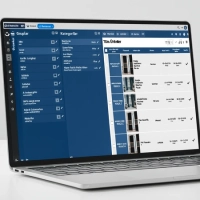
What is the Target Market? What is the Definition of a Target Market?
If you don't have a wide enough product range to include every product on your e-commerce site, you need to target potential customers who may be more likely to purchase your products. Your target market is the entirety of the customers who are more interested in the products and services you offer on your e-commerce site, who you can predict based on statistical data will be more willing to purchase, and with whom you and your company would like to work.
What is E-Commerce Target Market Selection?
Selecting an e-commerce target market involves determining the target audience to whom you aim to sell your products and services. This step is so critical that after selecting your e-commerce target market, you can analyze your competitors operating in that market and analyze market size and profitability. Target market selection includes segmentation, targeting, and brand positioning. It also allows you to develop marketing strategies tailored to your target audience, including product, price, and promotion steps within the marketing mix.
What are the Target Market Selection Strategies in E-Commerce?
We will generally discuss four different strategies for selecting a target market in e-commerce. These are:
1-Whole Market (Undifferentiated Marketing) Strategy
This strategy focuses on marketing strategies that focus on the entire market rather than focusing on differences within the target audience. It can also be described as a strategy where the vendor aims to attract customers who aren't looking for differentiation by launching products within specific product lines.
2-Multi-Market (Differentiated Marketing) Strategy
Do you want to establish a stronger position in e-commerce and achieve greater sales volumes? Then it wouldn't be an exaggeration to say that this strategy is designed precisely for this purpose. Rather than targeting a specific market, it's possible to develop different market targets and marketing strategies tailored to different product groups.
3-Single Market (Concentrated Marketing) Strategy
A single market strategy is a strategy that focuses on only one part of the market segmented according to certain statistics and that part is considered the target e-commerce market.
4-Niche Market (Narrow-Segmented Marketing) Strategy
It's a strategy developed to identify gaps by segmenting the market down to its smallest unit and launching products that fit these gaps. This area, typically viewed as low-volume by large e-commerce sites, can appear risk-free today, but risks can suddenly escalate. Therefore, creating the right product range through data collection and analysis is crucial for e-commerce companies operating with this strategy.
How to Conduct Target Market Research for E-Commerce Sites?
Primary Research
Data collected is analyzed using tools that provide a general understanding of the target market. Tools such as surveys, target audience analysis, and social network analysis are utilized. Because customer focus is paramount, past sales data is also included in the analysis.
Secondary Research
Researching the target e-commerce market is a process that heavily utilizes external sources. Data on customers, competitors, prices, products, and sectors found in research conducted by other companies can be analyzed and, in some cases, used in reports published by public institutions.
Have you reviewed Comwize's e-commerce ERP software? E-commerce companies using Comwize can easily access a wealth of statistics they need to identify target audiences and develop marketing strategies. With historical data and current reports offered by Comwize, you're one step closer to success.

























